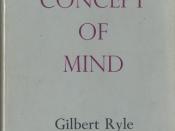Among the principal assumptions of major portions of philosophy in recent decades have been: (1) That philosophy somehow consists of (some sort of) logic, and (2) that logic is a study of and theory about (some sort of) language. There, of course, follows from these a third assumption: (3) That philosophy is a study of and theory about (some sort of) language--though this implication should not be taken as representing any phase of the historical development of recent philosophizing. Instead of listing these three points as assumptions, it would probably be more correct to regard them as categories or complexes of assumptions; or perhaps, more vaguely still, as 'tendencies' or proclivities of recent philosophical thinking. But precision of these points need not be put in issue here, as this paper does not seek any large-scale resolution of the problem area in question.
The aim here is to examine only one proposition which plays a role in the clearly existent tendencies referred to: Namely, the proposition that we think in or with language.
I hope to show, first, that we do not always think in or with language; and then, second, that the very conception of thinking in or with language involves an absurdity. What implications this has for broader philosophical assumptions or tendencies will not be dealt with here, though the implications in question seem to me to be extremely important ones.
That human beings think in language is explicitly stated in such diverse places as ordinary newspapers, the more sophisticated popular magazines and journals, and serious discourse in the humanities and the social sciences, as well as in the technical writings of philosophers. To prove this broad range of consensus would be idle; but, in order to have the philosophical context clearly before us, we may give a few...


